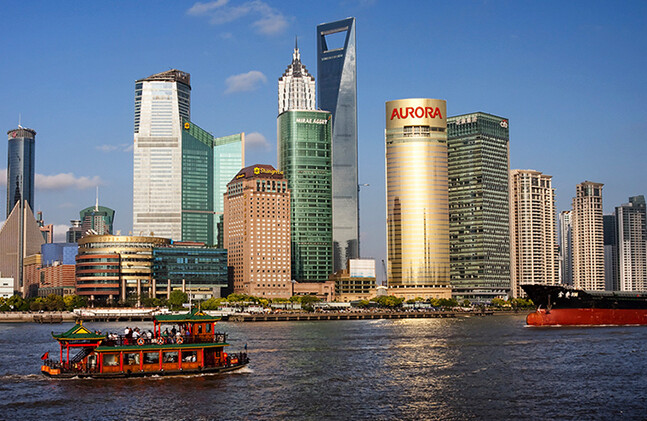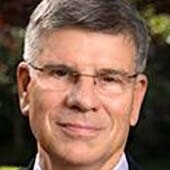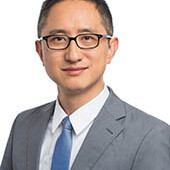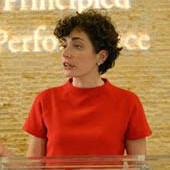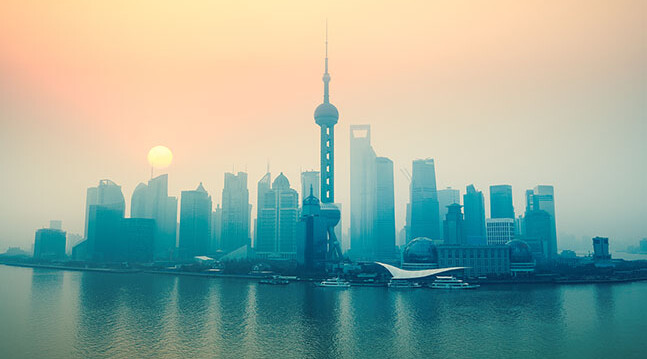With 30 years of growth under its belt, has China joined the ranks of "developed" economies like the United States and Japan? What are obstacles to China's economic growth? What are its success stories? And how is Hong Kong faring?
JULIA TAYLOR KENNEDY: You're listening to Impact from the Carnegie Council. Each episode, we explore a topic in global business ethics. This time, we turn to China. I'm Julia Taylor Kennedy.
After three decades of continuous growth—even if that growth is slowing down—is China joining the ranks of established "developed" economies like the U.S. and Japan? Over the next 20 minutes or so, we'll talk to experts about what may stand in China's way.
Let's start with one thing China has going for it: a bootstrap mentality that's entirely new to its economy.
MADELEINE LYNN: There are so many more opportunities for young people in China than there used to be. I'm Madeleine Lynn, director of communications here at Carnegie Council.
JULIA TAYLOR KENNEDY: Tell me about your relationship with China and Taiwan.
MADELEINE LYNN: Oh, my goodness. It goes back a very long way.
JULIA TAYLOR KENNEDY: It is a real treat to be collaborating with Madeleine on this podcast. She conducted interviews and helped us examine dynamics in the Chinese economy. And as an avid China-watcher, she's studied, lived and worked in China, Taiwan and Hong Kong.
MADELEINE LYNN: When I first started studying Chinese everybody thought I was crazy because China was not on anybody's map.
JULIA TAYLOR KENNEDY: The population was 86 percent rural.
MADELEINE LYNN: It was considered a backward country that nobody really was interested in. When I lived in China in the '80s very few people had the opportunity of going to university. People were limited to where they could live. Everybody had what they called a hukou.They had a registration. You lived in one place. You could not move without permission from your work unit; and that has completely changed. That has been done away with.
JULIA TAYLOR KENNEDY: In the 1980s, China was in the process of developing a robust market economy that still flourishes today. Basically, the government remained communist but agreed to stay out of the economy's way.
MADELEINE LYNN: There are so many more opportunities for people, and the basic standard of living for many, many people in China is so much better.
EVAN OSNOS: My name is Evan Osnos. I'm a staff writer at The New Yorker magazine.
JULIA TAYLOR KENNEDY: Osnos recently published a book called Age of Ambition, that tells the stories of self-made men and women who are emerging in China. [Editor's note: See Evan Osnos Carnegie Council talk on this book.]
EVAN OSNOS: There's a woman named Gong Haiyan. Actually, she started her life as Gong Hainan. She grew up in a family in the middle of nowhere, in the countryside. Her parents are farmers who can't read or write.
JULIA TAYLOR KENNEDY: The kind of upbringing that Madeleine just described.
EVAN OSNOS: She grew up in a very different moment, after all. She was born after China had climbed out of the Cultural Revolution, the political turmoil of that period. She got a terrific education and she looked at her parent's lives and said, "That's fine for them but that has nothing to do with me. I'll never be happy in a village like that."
JULIA TAYLOR KENNEDY: When Osnos met her, she was just out of graduate school and had moved to Beijing.
EVAN OSNOS: She had a very sophisticated cosmopolitan life in many ways. She looked around and realized that, "There's nobody I can meet to marry who's like me without the help of my parents but my parents, after all, everybody that they know is sort of like them." She faced this structural problem in how to meet the love of her life and settle down.
JULIA TAYLOR KENNEDY: So, she started a company to solve her own problem.
EVAN OSNOS: That's the Chinese equivalent of Match.com [a dating site]. When she did it, and essentially systematized the way in which people can choose and be chosen, she discovered there was this huge population of people out there, especially young people, who wanted to take part in this new culture of opportunity and essentially a culture of tailoring your life to your own desires.
Eventually she took the company public on the NASDAQ and made 77million dollars. I watched this all transpire in the course of a few years, which was, in some ways I think, a reflection of the sheer speed with which things happen in China today.
JULIA TAYLOR KENNEDY: Yan represents this new generation of entrepreneurs in China. There's another in the cohort that's been getting a lot of press lately in the U.S. Madeleine looked into the story of Jack Ma, founder of the Chinese e-commerce powerhouse Alibaba.
MADELEINE LYNN: In many ways Jack Ma has reinvented himself as the "Great Helmsman," which is what Mao was. He exhorts his workers to be ethical, and to work together, and all for the greater good.
HAO WU: My name is Hao Wu. I'm a fellow at the New America Foundation.
MADELEINE LYNN: Hao Wu is a very interesting person. He was born in China in the 1970s and he actually started his career as a molecular biologist. Now he's a documentary filmmaker. So he's done many different things, which is interesting in itself because these are the kinds of opportunities that his parents' generation would never have had. He worked for Alibaba in 2007.
HAO WU:—because it was considered the most local internet company in China back then.
In the early days of the Chinese internet industry, most of the internet companies were consciously trying to copy the business model, as well as some of the corporate culture from their peers in Silicon Valley. But Alibaba was an exception. Alibaba was very famous, even back then, for its very "local" culture, which in many ways meant there was a strong respect—some people might call it "worship"—of the founder, Jack Ma.
JULIA TAYLOR KENNEDY: Ma built his company very differently from the flat, casual culture embraced by Silicon Valley startups.
HAO WU: The company really emphasized building its corporate culture. Its senior management has a tight control over its vast employee base. Jack Ma and the senior management shift the business strategies constantly and each time, more than 20,000 employees just followed his orders.
It was really refreshing to see how this type of Chinese corporate culture, which included a lot of tight control, central command, can prosper in industry.
JULIA TAYLOR KENNEDY: Alibaba has been so successful, the company is in the process of an initial public offering that will list its shares in the U.S. It could be the biggest IPO in U.S. history, and Ma is making waves for the move. But why has he been so wildly successful in China? Why is his online platform so popular?
WILLIAM KIRBY: Alibaba has taken that risk out of businesses doing business with each other by being what you might call an honest broker, so that when you sell me something, and I send money to get that something, I know I'm going to get it because Alibaba will guarantee the honesty of the transfer.
I'm William Kirby and I am Spangler Family Professor at Harvard Business School [HBS] and T. M. Chang professor of China Studies at Harvard University.
JULIA TAYLOR KENNEDY: I spoke to Kirby because I wanted to better understand the factors that led to Alibaba's success. And he made a really interesting point. He said that what Alibaba does well is solve the biggest obstacle for China's economic growth: trust. Trust came up in every conversation that Madeleine and I had about China's economic ambition and what is holding it back. Trust used to be local.
MADELEINE LYNN: If you were in your village or in your small town, or even your city, the people you trusted, the people you did business with, were your family, and by extension your clan, and by further extension the other clans that your family dealt with. That is the traditional way of doing business in China, and it's very hard to get over that.
When you think about China, it's an enormous country. It's a continent. If I come from Guangzhou, Canton, and my friend comes from Beijing, we don't speak the same languages at home. We don't eat the same food. There's a big divide between north and south, the people in the west are different again. There are all kinds of levels of distrust to overcome.
JULIA TAYLOR KENNEDY: In developed nations, the government helps establish trust—with institutions and regulations that even the playing field. But that's not true if you are running a business in China.
WILLIAM KIRBY: You can't trust the government, basically. There's a long history of Chinese businesses having two or three different types of books, particularly for a family business.
JULIA TAYLOR KENNEDY: One for the government, one for the actual business, maybe one for a nosy uncle. It gets pretty complicated, and as a result, outsiders can't make heads or tails of the corporate governance structure.
WILLIAM KIRBY: It's a kind of a "Where's Waldo" of corporate management, and how do you find out who's really in charge—usually not just the CEO or the person who's deemed to be the CEO. So there's a great amount of uncertainty here, and you can see this in credit markets across the country.
JULIA TAYLOR KENNEDY: How do you check out a company if you can't even figure out who's running it? That's why Alibaba's vetting service is so valuable. But lack of trust is really pernicious in China. And all of our sources say that gets to the root of why the country can't be counted among the world's developed economies: if you can't trust the government, you have to resort to other methods to get government officials on your side.
WILLIAM KIRBY: Corruption has definitely gotten bigger. It's gotten more sophisticated, gotten incredibly sophisticated. It permeates all parts of society, particularly where, again, rules don't apply.
MADELEINE LYNN: I think what's happened is, under communism—for good or for bad—you had a value system. People were brought up believing that they should follow the party, they should not be corrupt. That's not to say that there wasn't corruption—of course there was. I don't want to talk about "the good old days." But at the same time, there was a structure, there was a value system, and that's disappeared.
When you think about it, for several generations you had people told that capitalists were evil, they were ruthless, they did whatever it took to get ahead. For many people, consciously or unconsciously, that is the way they view capitalism. It's no rules, no holds barred, do whatever you want to get ahead.
JULIA TAYLOR KENNEDY: Suddenly, the Chinese people were told to embrace capitalism even though they had been taught that capitalists are ruthless. New Yorker staff writer Evan Osnos sees corruption reinforced by easily-bribed government officials. And at its worst this corruption is deadly.
EVAN OSNOS: I think the most visible, the most emotionally potent example in China certainly is food and medicine that has been knowingly adulterated. Either they've created fake medicine or they've added compounds to it in order to make it appear to be more effective, safer than it is, and the effects have been dangerous. People have died as a result. Particularly in one case of adulterated baby formula, it harmed some of the most vulnerable people in society.
JULIA TAYLOR KENNEDY: Osnos sees people yearning for moral guidance.
EVAN OSNOS: I think there's been a real recognition over the last few years that something is missing. At the same time, the state has gone out of its way to try to adopt a more overtly moral language. They'll talk about things like moral cultivation. In fact there's a day on the calendar every year for moral education.
JULIA TAYLOR KENNEDY: But it's not provided in any consistent way.
EVAN OSNOS: If people get the message that it's okay to do things that are illegal, then they feel comfortable doing it. If they get the message that the leadership is holding itself to the highest possible ethical standard, well, then that may also affect their behavior.
Like a lot of things, the best line on this comes from Confucius in China. He said that the leaders are the wind and the people are the grass, and as the wind blows, the grass will lean in that direction. I see that very, very much in our life in China in the present day.
JULIA TAYLOR KENNEDY: Could China inject trust into its economy? Let's look at its neighbor, Hong Kong. While Hong Kong is now a city-state that belongs to China, it used to be a colony of the United Kingdom and has a much more traditional market capitalist economy.
WILLIAM KIRBY: The civil service in Hong Kong has a long and well-earned reputation for honesty. The courts as well. It's more open and transparent, and my guess is more honest than any American big city which tend often to be one-party states of their own in various municipalities.
JULIA TAYLOR KENNEDY: More than 60 years ago, back when Hong Kong was a UK colony, the city attracted a group of intellectual refugees from China.
WILLIAM KIRBY: When the communists took over China in 1949, Hong Kong was a well-run colonial backwater. An enormous amount of entrepreneurial talent comes from Shanghai in particular, but also all along the China coast from Guangdong to Hong Kong as a result of the revolution.
JULIA TAYLOR KENNEDY: With the rule of law from the UK and the business talent from Shanghai, Hong Kong flourished.
WILLIAM KIRBY: The communists indirectly make Hong Kong into this bastion of free enterprise, which it had not been before. A manufacturing center, now a service center, a logistics center. All the things that it had never been before, but helped enormously by the rule of law under the British.
JULIA TAYLOR KENNEDY: Over the years, even after the UK handed Hong Kong back to China in the late 1990s, the city has maintained its rule of law. Even though it's not really a democracy, Hong Kong's executive branch connotes its dedication to market capitalism.
MADELEINE LYNN: What a telling term—a chief executive—as though Hong Kong were a corporation or a business.
JULIA TAYLOR KENNEDY: Instead of using a democratic election, this elite group chooses Hong Kong's top leader. And in the absence of a true democracy, some of Hong Kong's business leaders fear an encroachment of Chinese-style corruption into their city.
MADELEINE LYNN: There's a movement that's grown up, which is called Occupy Central, and what they're really interested in is rule of law. China had promised that Hong Kong had the possibility of becoming fully democratic, and it looks like that's not going to happen.
EDWARD CHIN: My name is Edward Chin. I am one of the key supporters of the Occupy Central Movement with Love and Peace in Hong Kong.
MADELEINE LYNN: Edward Chin is interesting because he's not a student. He's not a professor. He's a finance guy. He's someone who used to run an enormous hedge fund. He's now running a family-run company. This is someone who's been educated abroad. He's one of the brightest and best in Hong Kong, and he feels very strongly that without democracy and without transparent business practices, Hong Kong cannot continue to be a vital city.
EDWARD CHIN: I am quite concerned about the amount of wealth that is concentrated in the hands of the selected few, just like people like to use the word, "the ruling class," in Hong Kong—which is probably 0.01 percent of the Hong Kong population. We are talking about 700 families. They control the real estate, your utilities, the supermarket, and what not. In unity we are fighting for one thing, which is a true democracy because we want fair play, fair competition. True democracy is important. Especially for an international city like Hong Kong.
We already see there's a lot of influence from mainland China prematurely.
JULIA TAYLOR KENNEDY: HBS professor William Kirby sits on a few university boards in Hong Kong. In his experience, Kirby hasn't seen much change.
WILLIAM KIRBY: I'm extraordinarily impressed by the quality of people who serve in government, both as civil servants, but also who are in the private sector who serve an advisory or many volunteer roles in government. It's really an extraordinarily well-run place.
JULIA TAYLOR KENNEDY: In fact, Kirby thinks Hong Kong is a great experiment that can teach China a lesson.
WILLIAM KIRBY: It does show that there's nothing culturally Chinese about not having X or Y capacity. When there are good systems in place, Chinese act differently than when there are bad systems in place.
JULIA TAYLOR KENNEDY: Think about it—what if China tried putting Hong Kong-like systems into other cities?
WILLIAM KIRBY: I think if China were allowed to experiment—and I hope this happens, you never know—experiment politically in the way that it has experimented economically—
JULIA TAYLOR KENNEDY: After all, in such a large country, maybe the current "one size fits all" approach is unsustainable.
WILLIAM KIRBY: It's as big as the United States. This country—the United States—who knows how long it will hold together? But it's held together probably a little bit better because of the federal system—that state A can do something that state B doesn't want to do and so on. And it is not a matter that everyone has to agree to the same set of principles.
Some sense of real autonomy, local autonomy actually could bring out much more in the capacity of Chinese in different parts of the country.
JULIA TAYLOR KENNEDY: Is there hunger in China to experiment with different systems of governments? New sets of principles, that could bring trust into the marketplace?
New Yorker writer Evan Osnos has one strong piece of evidence that the Chinese are starved for new moral frameworks. He wrote a profile of a U.S. philosopher who was received like a rock star in China.
EVAN OSNOS: Michael Sandel is probably more surprised than anybody. He is after all, as many people I think know, he is a political philosopher who teaches at Harvard and originally from Minnesota. Moved out to California when he was a teenager. [Editor's note: See Sandel's Carnegie Council lecture on justice.]
JULIA TAYLOR KENNEDY: Sandel had no ties to China until a video series of his Harvard lectures was distributed there.
EVAN OSNOS: They were subtitled, they were made available for free, and they were a sensation. People were downloading them by the tens of millions.
JULIA TAYLOR KENNEDY: In the lectures, Sandel ran his students through scenarios that exposed deep ethical dilemmas.
EVAN OSNOS: What are my responsibilities as a citizen, for instance, to help my fellow man? Are there things that I should be doing governed by universal codes of ethical behavior? The whole conversation was very un-Chinese. He wasn't referencing any Chinese philosophers. He wasn't talking about traditional debates about the role of the intellectual towards the emperor, things like that. Yet it resonated.
JULIA TAYLOR KENNEDY: The video lectures were popular enough that Sandel went on tour in China—and Osnos tagged along.
EVAN OSNOS: He was attracting these huge crowds that the newspaper, the local newspaper was comparing to a rock star or an NBA star.
JULIA TAYLOR KENNEDY: Do you think this is another signal of a yearning for some moral framework?
EVAN OSNOS: I think that there's this kind of hunger at the moment for an ethical conversation in China about the boundaries of behavior, about proper conduct, about what it means to be a good citizen. The thing that's most interesting about it is that it's a conversation that's bubbling up from below, from people themselves, rather than being something that's directed from above.
JULIA TAYLOR KENNEDY: What kinds of questions would they ask him?
EVAN OSNOS: Oftentimes he would pose the question and then they would answer. And what he's asking people is, for instance, should there be an unregulated market in human organs? If we know that there are people out there who need a kidney transplant and we know that there are other people who want to sell them a kidney, well why shouldn't we allow that to happen?
This is behavior that is, after all, prohibited under law in China. It's prohibited in the United States. He would have people stand up and raise their hands in China and students would say to him, "I think we should allow the buying and selling of organs." Because what it does is it allows people to make judgments for themselves about how they want to allocate their resources, what is important to them, what they need to buy, and what they're willing to sell.
He said, "Okay," and he upped the stakes a little bit. He said, "What happens if somebody says, 'I've lived a good life. I've already sold one kidney. I think I'm going to sell my second kidney in order to pay for the education of my daughter, even if it means that that's the end of my life.' Should we allow that to happen?" I watched him at a university in Xiamen in southern China, and there was a student who stood up and said, "Absolutely we should allow that." Oftentimes these sorts of theoreticals end up occupying the extreme end of one end of the spectrum or the other, and the whole point of the exercise is to draw out these contrasts in really vivid detail.
But what was fascinating was to watch this ferment in the crowd. There were people who stood up and shouted, "No! You shouldn't do that. You shouldn't allow that kind of unregulated market."
I could tell you that for Michael Sandel, who's been all over the world talking about the limits of markets and moral behavior, when we were in the car driving away the next morning he said, "I've never seen a more orthodox image of the importance and the possibilities of a free market than I have in China, with the sole exception of the United States."
I think what's interesting about it is just that it's a reflection of some of the ways in which the United States and China have become more like each other than I think most Americans would probably imagine.
JULIA TAYLOR KENNEDY: After all, the U.S. went through its own period of ambitious, corrupt entrepreneurship.
EVAN OSNOS: In the United States we were laying railroad tracks across the country for the first time. The transcontinental railroad was built. It was also the source of enormous corruption. One of the railway men who was involved in the production and the creation of the transcontinental railroad later said that, "Our business," as he put it, "is founded on lying, cheating and stealing."
JULIA TAYLOR KENNEDY: Fast-forward to China today.
EVAN OSNOS: The minister of railways, whose name is Liu Zhijun, was eventually discovered to have been not only hugely ambitious—he was in charge of building more high-speed railway than the rest of the world combined—but he was also enormously corrupt. He oversaw a huge government entity, had more employees than the entire federal workforce of the U.S. government, and there was really nobody there to tell him not to.
As a result, he ended up stealing tens of millions of dollars. He made sure that other monies totaling in the hundreds of millions ended up getting into the pockets of his friends and allies. He ended up going to jail.
In the American story, we had to go through this period of enormous corruption and moral confusion before we built the sorts of institutions—whether it's the Food and Drug Administration or more vigorous labor unions—that would be able to protect people from abuses of power.
JULIA TAYLOR KENNEDY: Maybe this is just a stage that China is going through on its path to free market capitalism. Maybe it will inevitably emerge from a corrupt period of ambition and enter a period of well-regulated market capital, with a market full of trust initiated by entrepreneurs like Jack Ma.
EVAN OSNOS: In China, that is an open question. We don't know, frankly, whether the government is prepared or is capable of taking on those kinds of self-auditing functions. Whether it will submit itself, ultimately, to oversight in a way that would allow it to clean itself up.
JULIA TAYLOR KENNEDY: Is its ability to succeed on a global scale also connected to that ability to clean itself up?
EVAN OSNOS: Yes, I think it is. It's tempting, I think, to look at it and say, "Well, they're always going to win because they've got this lower price point. They are willing to make deals with governments without strings attached." They, for instance, are unencumbered by things like the U.S. Foreign Corrupt Practices Act, which prevents American companies from giving or taking bribes overseas.
But I think it's also worth pointing out that sometimes that is simplistic and we under-appreciate the role of these local markets. I've been in Burma, for instance, talking to people about, "Well, what do you think of Chinese competitors?"
I remember one conversation that I had with somebody who was involved in the Burmese government. "Are you guys putting your data," for instance, "into a Chinese cloud service provider?"
They said, "Would you put your data into a Chinese cloud service provider?"
In some ways I think they're dubious. They're a little bit uncertain about whether they're going to get the kind of corporate integrity, corporate responsibility that they would expect. That worries them.
JULIA TAYLOR KENNEDY: While Osnos senses global mistrust of Chinese technology, Madeleine sees it as a way forward.
MADELEINE LYNN: I think that a lot of Chinese are looking for values and norms. They don't want it to be a free-for-all. I think, now, there is a backlash against that, and against the people who made money in unscrupulous ways. The internet and social media mean that China is more transparent than it's ever been in history. People know what's going on. They're not happy with it.
JULIA TAYLOR KENNEDY: But will the government respond—perhaps by trying some of the local experiments that HBS professor William Kirby has prescribed?
EVAN OSNOS: That's one of the things we want to be watching out for in the future. If we're trying to understand if China can clean up, I think the questions we should be asking are: Is it prepared? Is it willing? Is it taking the steps to build the institutions that will ultimately protect it from people's worst instincts?
JULIA TAYLOR KENNEDY: Thanks for listening to Impact from the Carnegie Council, and a special thanks to our crack production team Mel Sebastiani, Terence Hurley, Deborah Carroll, and Amber Kiwan. I'm Julia Taylor Kennedy. You can find out more about this podcast at carnegiecouncil.org.
